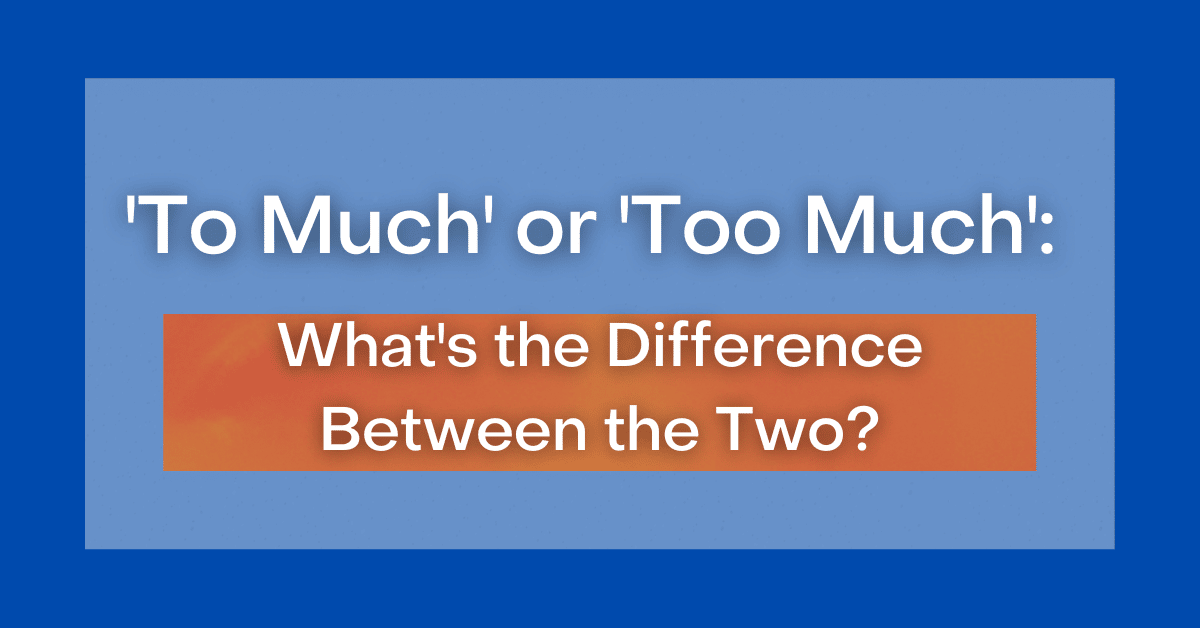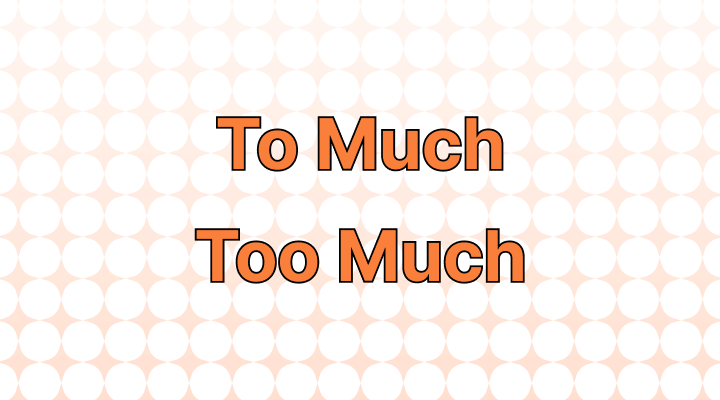"To much" is not a standard phrase in English. "Too much" is a common English phrase that is used to indicate an excessive amount or an extent beyond what is considered appropriate or necessary.
The difference between "to much" and "too much" lies in their spelling and usage. These two phrases may look similar, but they have distinct meanings and are used in different contexts.
What does to much mean?
"To much" is not a standard phrase in English. It appears to be a typo or a grammatical error that occurs when the word "to," which is typically used as a preposition or part of an infinitive verb, is mistakenly used in place of "too."
"To much" could be a coincidental pairing in a sentence as well.
What does too much mean?
"Too much" is a common English phrase that is used to indicate an excessive amount or an extent beyond what is considered appropriate or necessary. It often implies a negative connotation. For example, if you say, "I ate too much cake," you're expressing that you consumed more cake than you should have, possibly resulting in discomfort or a feeling of overindulgence.
"Too much" can also be used to describe situations or conditions where something is in excess. For instance, "There is too much noise in this room," signifies that the level of noise is greater than what is tolerable or comfortable.
Example sentences
- She added too much sugar to her coffee, making it unbearably sweet.
- The chef accidentally poured too much salt into the soup, rendering it inedible.
- He spent too much money on clothes and now regrets his shopping spree.
- The student used too much highlighter when studying, making the text difficult to read.
- The car's engine was damaged because it had been revved too much.
- She applied too much pressure while writing with a fountain pen, causing the ink to blot on the paper.
- The party had too much noise and chaos, making it hard to have a conversation.
- He consumed too much caffeine in a short period, leading to jitters and anxiety.
- The company printed too much promotional material, resulting in excess waste.
- The teacher assigned too much homework, leaving the students overwhelmed and stressed.
Synonyms for "too much"
- Excessive: Excessive implies going beyond a reasonable or necessary limit.
- Example: "She ate an excessive amount of cake at the party, feeling ill afterward."
- Overwhelming: Overwhelming conveys a sense of being overpowering or intense.
- Example: "The amount of work he had to do felt overwhelming, making him stressed and anxious."
- Inordinate: Inordinate refers to something that is far beyond what is usual or expected.
- Example: "The inordinate amount of rain this month caused flooding in many areas."
- Surplus: Surplus indicates an excess or an amount beyond what is needed.
- Example: "The store had a surplus of inventory, so they decided to have a clearance sale."
- Unreasonable: Unreasonable implies that something is not justifiable or fair in terms of quantity.
- Example: "The price of the concert tickets was unreasonable, so I decided not to go."
- Unwarranted: Unwarranted suggests that something is excessive and not justified by the circumstances.
- Example: "His unwarranted anger over a minor mistake surprised everyone."
- Superfluous: Superfluous means something that is unnecessary or more than what is required.
- Example: "The additional features on the app seemed superfluous and confusing to users."
- Exorbitant: Exorbitant refers to something that is unreasonably high, often in terms of price or cost.
- Example: "The cost of living in the city is exorbitant, making it difficult for many to afford."
- Redundant: Redundant implies that there is an excess or duplication of something.
- Example: "The redundant information in the report made it unnecessarily long and complex."
- Oversaturation: Oversaturation refers to the state of having too much of something in a specific area or market.
- Example: "The oversaturation of similar products in the market led to fierce competition."
Common idioms/phrases
- Too much of a good thing: This idiom means that excessive indulgence in something positive can have negative consequences. For example, "Eating ice cream every day is too much of a good thing; it can lead to weight gain."
- Too much on one's plate: When someone has too many tasks or responsibilities to handle at once, you can say they have "too much on their plate." For instance, "I can't take on any more projects at work; I already have too much on my plate."
- Too much of a good thing is bad: This idiom emphasizes that even enjoyable things can become tiresome if overdone. For example, "I used to love playing video games, but now I think too much of a good thing is bad."
- Too much of a good thing can be wonderful: Often attributed to Mae West, this phrase suggests that an excess of something pleasurable can be incredibly enjoyable. For instance, "she believes that too much of a good thing can be wonderful, so she indulges in chocolate without guilt."
- Throw too much light on something: This idiom means to reveal too much information about a topic, often implying a lack of discretion or tact. For example, "During the interview, he threw too much light on his personal life, which was unnecessary."
- Too much of anything is good for nothing: This saying implies that an excess of anything, even something valuable, can lead to negative outcomes. For instance, "Studying all the time may seem productive, but remember, too much of anything is good for nothing."
- Too many cooks spoil the broth: This idiom suggests that when too many people are involved in a task or decision-making, it can lead to confusion and mistakes. For instance, "We had so many people giving input on the project that it felt like too many cooks were spoiling the broth."
- Too much of a stretch: This phrase is used when something seems difficult or unlikely to happen. For example, "Saying he can run a marathon with no training is too much of a stretch."
- Too much of a burden: When something becomes too overwhelming or difficult to handle, it is described as "too much of a burden." For instance, "The financial responsibilities of owning a large house became too much of a burden for them to handle."
To sum it up, the key distinction is that "too much" is the correct phrase used to express excess or exaggeration, while "to much" is not a valid expression in standard English, unless it is a coincidental pairing. So, when you want to convey the idea of something being excessive, remember to use "too much" with the word "too" spelled with an extra 'o.'
Want to sound like a native speaker?
Engram’s AI-powered grammar checker makes your English sound like a native speaker’s, suggesting natural English expressions on top of fixing grammar, spelling, punctuation, word order, and vocabulary.

Reference














